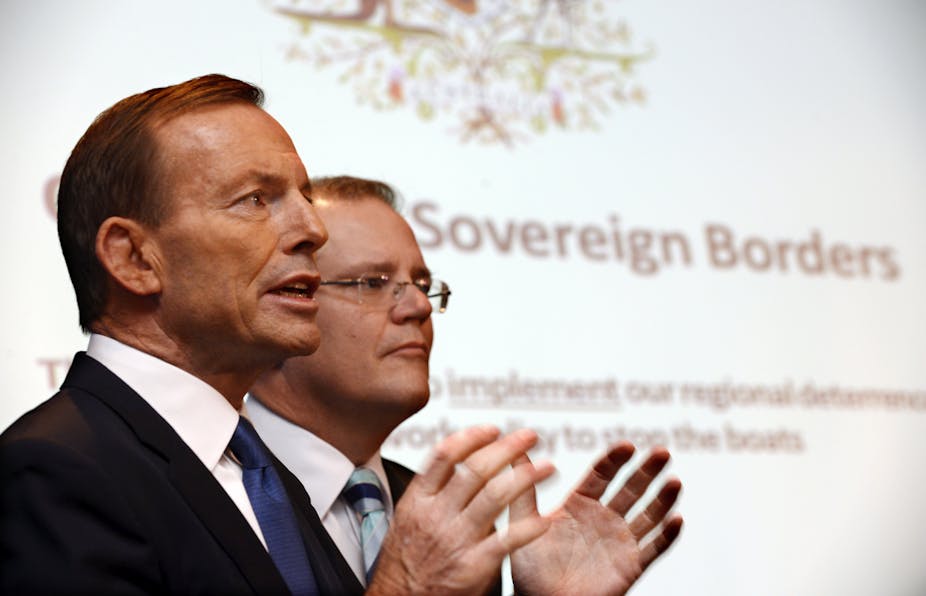Just when you thought being “tough on borders” couldn’t get any more serious, along comes the Coalition’s Operation Sovereign Borders.
It’s got all the right elements of a plan: it’s an operation (with 12 separate government agencies under the central command of a 3-star general no less), highlights the centrality of national sovereignty and reinforces Howard-era sentiments about border control. So how does it stack up against the Rudd government’s Regional Resettlement Arrangement?
Both plans emphasise coordination. Coordination amongst operational agencies was a concern raised earlier by the Expert Panel on Asylum Seekers. This report focused on the need for coordination in the areas of regional cooperation for protection and asylum frameworks, and strategic dialogue with resettlement countries. It also recommended a whole-of-government approach on engagement with source countries including for the removal and return of failed asylum seekers.
On defence and security matters the Expert Panel suggested the development of joint operational guidelines for managing search and rescue activities in the region and to address the need for any further regional and national codification of arrangements across search and rescue jurisdictions. Even though the Expert Panel was led by Retired Air Marshal Chief Angus Houston, acting Chief of the Defence Force during the “children overboard” incident in 2001, it did not raise coordination between Australian government agencies cooperating on border security as an area in need of improvement.
The highly criticised Regional Resettlement Agreement, approaches the issue of asylum seekers from a foreign policy perspective. This is no surprise given Kevin Rudd’s interest in this area and the precedent already set with offshore processing on Manus Island. It links success of the agreement with a possible increase in the offshore humanitarian program to 27,000 places. Under-pinning the whole agreement is an assumption that deterring people from coming to Australia will “send a message” to people trying to seek asylum in Australia. The social media campaign that accompanied the announcement of the Regional Resettlement Agreement was testimony to this objective.
Opposition Leader Tony Abbott has already been criticised for his alleged lack of diplomatic skills when commenting upon the Regional Resettlement Agreement. Unsurprisingly then, Operation Sovereign Borders moves away from the foreign policy domain and presents a defence and security-centric response. It will, through a joint taskforce, allow for the turning back of boats where it is safe to do so and the deployment of additional vessels to relieve patrol vessels of passenger transfers. The plan also refers to increasing capacity at offshore processing centres on Manus Island and Nauru.
The Liberal party claims the need for this taskforce is because the “current multiplicity of agencies and reporting lines provides for conflicting strategies, disconnected systems, fractured accountability, inadequate information system, duplication, higher costs and turf wars”. The main evidence presented to support this claim is that of the case of people smuggler Captain Emad which highlighted issues about cooperation between the Department of Immigration and Australian Federal Police. A commitment remains to regional cooperation on people smuggling through the Bali process. Similar to the Regional Resettlement Agreement, the Operation Sovereign Borders plan, claims it will send a message to people smugglers and their prospective passengers.
Interestingly a similar defence-based option is at the preliminary stage of discussions in Europe for border guards to patrol the external borders of the European Union.
With two very different plans now on the table, each promising the same outcome, it’s worth reminding ourselves of another recommendation of the Expert Panel. In the face of incomplete evidence on asylum issues, the Expert Panel suggested a well-managed and adequately funded research program engaging government and non-government expertise be set up. Without this evidence base, any plan resting on the assumption that asylum-seekers can be out-manoeuvred by deterrents and a social media campaign is doomed to fail. Policies will continue to emerge from left-field as knee jerk reactions to announcements the day before.
Prime Minister Kevin Rudd and Opposition Leader Tony Abbott will still look like contenders fighting the final challenge on the reality show “Survivor”. And most importantly, asylum-seekers fleeing persecution will not be able to access the mechanisms to which they are entitled, to access protection onshore in Australia.

